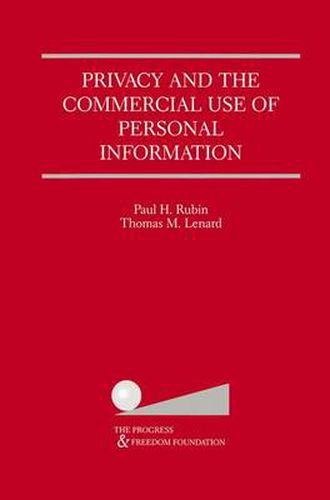Readings Newsletter
Become a Readings Member to make your shopping experience even easier.
Sign in or sign up for free!
You’re not far away from qualifying for FREE standard shipping within Australia
You’ve qualified for FREE standard shipping within Australia
The cart is loading…






This title is printed to order. This book may have been self-published. If so, we cannot guarantee the quality of the content. In the main most books will have gone through the editing process however some may not. We therefore suggest that you be aware of this before ordering this book. If in doubt check either the author or publisher’s details as we are unable to accept any returns unless they are faulty. Please contact us if you have any questions.
The debate over privacy presents some complex policy-making challenges. While data on consumers has long been used for marketing purposes, the Internet has substantially increased the flow of personal information. This has produced great benefits, but it also has raised concerns on the part of individuals about what information is being collected, how it is being used and who has access to it. These concerns, in turn, have led to calls for new government regulation. This study focuses on the market for personal information used for advertising and marketing purposes, which is the market affected by most of the regulatory and legislative proposals under consideration. It addresses the following basic questions: are there failures in the market for personal information?; if market failures exist, how do they adversely affect consumers?; can such failures be remedied by government regulation?; and would the benefits of government regulation exceed the costs? The authors find that the commercial market for information appears to be working well and is responding to consumers’ privacy concerns. They conclude that regulation imposed on a medium like the Internet that is changing so rapidly would have unpredictable and costly consequences. This study is a product of The Progress & Freedom Foundation’s project on Regulating Personal Information: Balancing Benefits and Costs. The Progress & Freedom Foundation studies the impact of the digital revolution and its implications for public policy. It conducts research in fields such as electronic commerce, telecommunications and the impact of the Internet on government, society and economic growth. It also studies issues such as the need to reform government regulation, especially in technology-intensive fields such as medical innovation, energy and environmental regulation.
$9.00 standard shipping within Australia
FREE standard shipping within Australia for orders over $100.00
Express & International shipping calculated at checkout
This title is printed to order. This book may have been self-published. If so, we cannot guarantee the quality of the content. In the main most books will have gone through the editing process however some may not. We therefore suggest that you be aware of this before ordering this book. If in doubt check either the author or publisher’s details as we are unable to accept any returns unless they are faulty. Please contact us if you have any questions.
The debate over privacy presents some complex policy-making challenges. While data on consumers has long been used for marketing purposes, the Internet has substantially increased the flow of personal information. This has produced great benefits, but it also has raised concerns on the part of individuals about what information is being collected, how it is being used and who has access to it. These concerns, in turn, have led to calls for new government regulation. This study focuses on the market for personal information used for advertising and marketing purposes, which is the market affected by most of the regulatory and legislative proposals under consideration. It addresses the following basic questions: are there failures in the market for personal information?; if market failures exist, how do they adversely affect consumers?; can such failures be remedied by government regulation?; and would the benefits of government regulation exceed the costs? The authors find that the commercial market for information appears to be working well and is responding to consumers’ privacy concerns. They conclude that regulation imposed on a medium like the Internet that is changing so rapidly would have unpredictable and costly consequences. This study is a product of The Progress & Freedom Foundation’s project on Regulating Personal Information: Balancing Benefits and Costs. The Progress & Freedom Foundation studies the impact of the digital revolution and its implications for public policy. It conducts research in fields such as electronic commerce, telecommunications and the impact of the Internet on government, society and economic growth. It also studies issues such as the need to reform government regulation, especially in technology-intensive fields such as medical innovation, energy and environmental regulation.